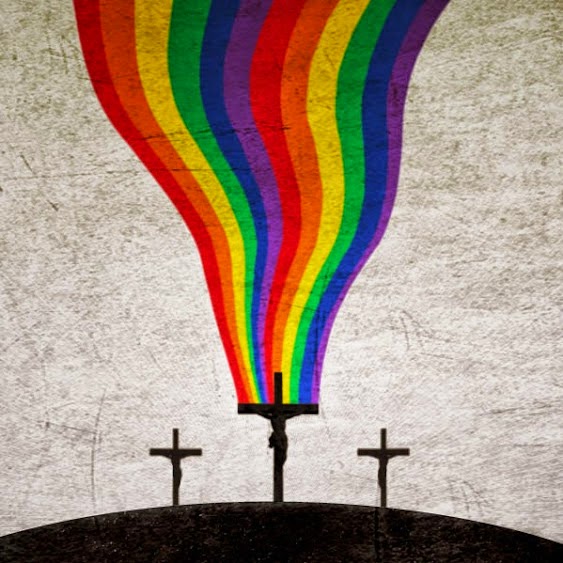When I saw the search terms someone recently used to find my website, I couldn’t help but smile sympathetically. They had typed “karen r. keen, is she a real Christian?” The question was likely prompted by my new book Scripture, Ethics, and the Possibility of Same-Sex Relationships. After 20 years of wrestling with my own sexuality, participating in the ex-gay and celibate gay movements, and studying the Bible in postgraduate programs, I now affirm covenanted same-sex relationships. I understand why someone would question the genuineness of my faith. I remember the days when I asked that same question of others. At the heart of the inquiry is a deep love of truth and desire for God’s goodwill to prevail.
Several years ago, I was flipping through the local newspaper and noticed an article on a documentary-in-the-making about God, gays, and the Bible. Two lesbian filmmakers, Kim Clark and Luane Beck, were on a mission to reconcile Christianity with sexual identity. My first reaction was annoyance. “This is wrong,” I muttered to myself, “How can anyone read the Bible and think it affirms homosexuality?” Without knowing these women, I made all kinds of judgments about their motives, believing they were purposely mangling the truth. After all, wasn’t scripture plain to anyone who really wanted to see it?
Yet, as I continued to ponder the article, my irritation turned to curiosity. How do some Christians reconcile same-sex relationships with the Bible? I had read the standard progressive arguments, but they were not compelling to me. Were gay-affirming Christians intentionally hardhearted, or was there more to the story? I wanted to stand in their shoes for just a moment to comprehend how they could arrive at such a different conclusion than me. So, being the nerd that I am, I decided to turn my question into a research project.
After developing a lengthy survey with more than 60 multiple choice questions on theological beliefs and sexual identity, I contacted the local LGBTQ center and other organizations to find folks willing to subject themselves to an interview. Of course, on my list of targets were filmmakers Kim and Luane. Amazingly, they agreed to let me interview them on one condition: They could interview me in return. That’s how I ended up featured in the very documentary that provoked my initial annoyance!
During these months as the film God and Gays: Bridging the Gap was pieced together, I had several meaningful conversations with Kim and Luane, as well as other individuals I was interviewing. In the process, I came to the unsettling realization that my previous assumptions about gay-affirming Christians had been superficial. While I ultimately didn’t agree with their conclusions (at the time), I knew I could no longer caricature them as rebels deliberately distorting the truth. Many of the people I interviewed had sincerely prayed and studied scripture, seeking answers from God.
READ: Why I Stand with the LGBTQ Community
The impulse to seek truth is a good one. As the scriptures teach, “Love does not delight in evil, but rejoices in the truth” (1 Corinthians 13:6). Truth brings all things to the light, chasing away the shadows. Truth is what makes being known and knowing others possible. Yet, too often fear and judgment preempt the quest for truth. When I was growing up, I regularly heard warnings to not read or listen to voices that contradict certain church teaching, lest we be led astray. We were encouraged to only socialize with like-minded people and learn from like-minded teachers.
The fear of going astray was strong. As a result, we kept our distance from “them” (whoever “they” might be). Even as I came to discover my own sexual orientation, my head was full of stereotypes about LGBTQ people. Ironically, it was avoiding people who believed differently from me that led to being deceived. My imagination filled in the blanks with false caricatures. I had to draw near to those I disagreed with to discover what is true and what are just ghost stories. Only in coming face to face did the blurry outlines take clear shape.
Kim and Luane did not change my beliefs on same-sex relationships; that would come later through my own intensive study of the scriptures. But personal engagement with them chastened me against presumptions of superiority. I had judged them unfairly. My presuppositions about their spiritual life were wrong. This experience reinforced to me the value of curiosity.
Asking questions is not a sign of hardheartedness. It demonstrates that we actually care about evidence and are willing to work hard to seek it out. What if I had not pushed myself to investigate? What if I had been content to make aloof judgments? I would not have seen the truth.
That’s why I feel hopeful about the person who sat down at a computer and typed into Bing their curiosity about my status as a real Christian. Their question, if sincere, represents an openness to investigation. Is it possible that a gay Christian like me who affirms same-sex relationships is, indeed, a faithful sister in Christ? If that is your question, may you draw near enough to see me for who I am.

